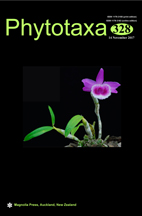Abstract
Madagascar is a major centre of diversity for the leaf-succulent genus Aloe Linnaeus (1753: 319) accounting for roughly a third of Aloe species (Carter et al. 2011). Approximately 128 species and 161 taxa are known from the region and all are restricted to Madagascar (Rakotoarisoa et al. 2014) and/or the nearby Mascarene archipelago. New taxa are described from these islands at a rate that rivals the ongoing discovery of aloes elsewhere in their natural range, on the African continent or Arabian Peninsula (Crouch et al. 2013). Extinction risks are alarmingly high among species of Aloe in this region. Conservatively, 39% of species are known to be threatened, and this figure is likely to be significantly higher (Rakotoarisoa et al. 2014), since several species have not been observed or collected for many decades. The Kew Madagascar Conservation Centre (KMCC) aims to record and collect the rare and threatened flora of Madagascar to ensure its conservation, and the genus Aloe is a priority for the dryland programme.

